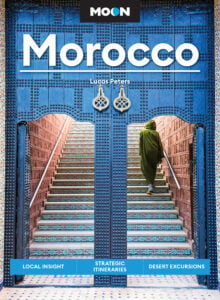Peter Mayne’s A Year in Marrakesh was first published nearly 60 years ago. It remains a remarkable achievement in travel writing, even today, for its insights into a culture isolated from much of modernity’s reach.
Travel memoirs seem to fall into three camps.
- There is the guidebook, where the author fills the pages with historical facts, telling the colorful past of the author’s current view.
- There is the narrative history, where the author travels with personal baggage that gets unpacked throughout the journey.
- And there is the immersion narrative, where the author becomes nearly invisible, except as a portal through which one tastes the food, talks with the locals and tells of life in another time and place.
Make no mistake, Peter Mayne’s memoir about his time in Marrakesh falls in the third category. The early 1950’s were a tumultuous time for Morocco. The country gained independence from France in 1956. With political tensions were rife. But for Mayne, the turmoil of daily life was the only one that mattered.
Determined to settle in the city like a native and not a tourist, Mayne walks the delicate line between foreigner and observer. He vacillates between the frustrations and joys of his new life. Much like a long trip, the book starts out slowly, a languid pace that has all the time in the world to explore a new place. And much like a trip, it is suddenly over, and too soon.
Mayne dispenses with much of the standards of personal narrative. We know little of his home, or his history. In fact, it is fair to say that throughout the book, one does not ever get to know Mayne. His personal life intrudes only rarely into the accounts of dealings with his Marrakesh neighbors, landlords, servants, acquaintances, and friends. His focus is not on the life he has left behind in England. And he does not make much of what lies in his future besides the most pressing and immediate needs. Despite the frequent mentions of writing (or, as often, the avoidance of writing) a novel, the contents of whatever that work of fiction might or might not be are kept far away from these pages.
It is exactly this lack of context — politics, pop culture, even the author’s personality — that makes this story a travel classic. The elements that rise through the drudgery of Mayne finding lodging, making food, escaping the heat, and learning a language, are transcendent human traits. Mayne is a patient, respectful traveler, though not without his own biases and shortcomings. Still, he is a true observer, ever curious of the little differences, ever looking for the common ground.
… perhaps we should include this in our list of Morocco Must Read Books! What do you think?
Written by Erin Tolman.









